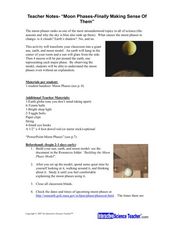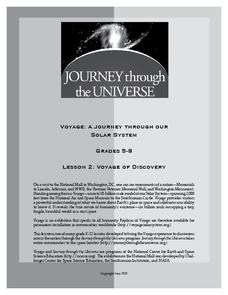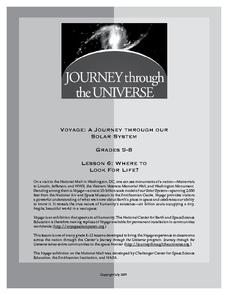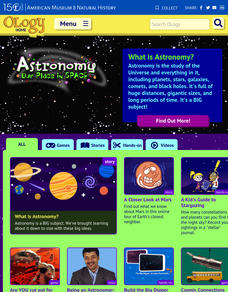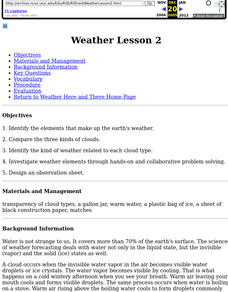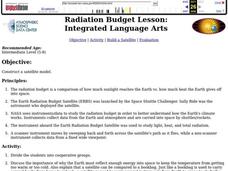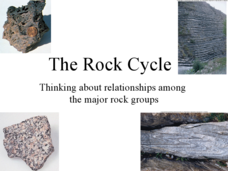Curated OER
Make a Shadow Clock
Students make shadow clocks. In this earth science lesson, students follow the provided steps to make shadow clocks out of the provided pattern and tagboard. A game, a song, a craft, and a recipe are all included with the lesson.
Curated OER
Winter Season
Students recognize the relationship between Earth's tilt and the Winter season. In this Winter lesson, students work in pairs to complete make frost and design snow goggles. Students experiment a hand lens to study the frost created....
Curated OER
Water Cycle in a Box
Fourth graders investigate how the water cycle is vital for all living things to survive on Earth. They observe the teacher set up a simulation of the water cycle using a Plastic Earth Simulator, desk lamp, and water, and make...
Curated OER
Moon Phases - Finally Making Sense of Them
Students investigate the different phases of the moon. In this lunar cycle lesson, students create models of the sun, earth and moon and investigate why we observe the moon the way we do. Students observe a PowerPoint presentation...
Curated OER
Reasons for the Seasons
This worksheet requires the pupils to follow a teacher activity, so more-than-the-usual preparation for a practical is needed. Looking at a globe as it rotates and receives "sunlight" from a flashlight, pupils are able to observe the...
Center for Math and Science Education
Solar System Launch
Trying to understand the vastness of outer space can be quite a challenge for young scientists. Help put things in perspective with this cross-curricular activity as students work in pairs creating scaled models of the solar system,...
Curated OER
Make a Solar Sill
Students design a solar still and purify water. In this earth process and design lesson, students observe how the heat of the sun helps to purify water. Students analyze why this could be helpful on a desert island. Students record...
California Academy of Science
Modeling Eclipses with Size and Distance Scales
Size within the solar system is a difficult thing for pupils to imagine. Using everyday objects, they build models to show the scale between the sun, moon, and Earth. They situate their props in proportional distances between the objects...
Journey Through the Universe
Voyage of Discovery
Did you know that Pluto is smaller than the United States of America? It is difficult to conceptualize the size of planets and the distance between them, and the lesson addresses those exact issues. After a discussion, pupils create...
Curated OER
Seein' Double, Seein' Double
By using the Internet, hands-on activities, video, and cooperative learning, pupils look into the conditions in which light casts shadows on objects. The lesson includes fabulous hands-on activities, art projects, worksheets, and reource...
Journey Through the Universe
Where to Look For Life?
Every year we discover new planets including more than 1,000 in 2016 alone. Will we ever find life on another planet? The lesson includes two activities to help scholars understand this concept. First, they analyze the temperature range...
American Museum of Natural History
Planetary Mysteries
A website all about planetary mysteries—it's a one-stop-shop for all things, stars, planets, and space travel. Scholars read an astronomy overview to discover the page's big ideas, then choose from the plethora of resources, including...
Curated OER
Solar Eclipse
Students demonstrate the revolution of the moon around the earth and the effect of its direct alignment in between the earth and the sun.
Curated OER
Cloudy vs. Clear
Students analyze line plots. In this weather activity using real NASA data, students discuss how weather affects the way the Earth is heated by comparing different line plots.
Curated OER
Satellites and the Radiation Budget
Young scholars engage in a prelab discussion about the earth's radiation budget and global warming. They use "trading cards" to find specific websites to research radiation budget questions.
Curated OER
Weather Lesson 2
Students identify the elements that make up the earth's weather. Begin by having students pretend they are hiking along a mountain ridge. It's been sunny and warm all day, but you see a dark line of clouds moving from the west.
Mr. E. Science
Stars, Galaxies and the Universe
It takes 225 million years for our sun to travel around the galaxy. The presentation covers astronomical units, light years, telescopes, types of stars, the life cycle of a star, and types of galaxies. This is the last lesson in a...
Curated OER
The Work of Waves and Wind
This is not revolutionary, but it is informative. Earth science viewers in grades 7-12 get carried away with wave and wind erosion. They view diagrams of how waves impact ocean shorelines. They see examples of the different types of sand...
Curated OER
Time Zones
Students study the reason why time zones exist and how they are established. They predict time zones for different places on Earth.
Curated OER
Radiation Budget
Young scholars examine the radiation budget and the launching of the Budget Satellite. They role-play as designers of the satellite and construct one with a power source, instruments, and sensors. they explain how their satellite...
Curated OER
Magnetic Turtles
Middle schoolers encounter how magnetic forces affect the navigation ability of sea turtle hatchings. Research is done to find out where the true magnetic North Pole lies. Exploration is discussed on how many things here on earth are...
Curated OER
A Map as a Tool
Students study the concept of using a map as a tool with the usage of a balloon designed to mimic the features of the Earth with the major features marked and shown on the balloon.
Curated OER
The Rock Cycle - Thinking About Relationships Among the Major Rock Groups
Step-by-step, arrow-by-arrow, viewers are walked through the rock cycle. In the end, you have a simple, yet complete diagram of the process. Pictures appear to show samples of igneous, sedimentary, and metamorphic rocks. The presentation...
Curated OER
Ocean Waves and Tides
Except for a few blurry photos that you can leave out, this is a succinct, yet purposeful presentation. It explains what causes ocean waves, the parts of a wave, and how they break against a shore. It details the cause of tides and...
Other popular searches
- Earth Moon Sun System
- Earth Sun and Moon
- Earth/sun/moon
- Earth and the Sun
- Earth, Sun and Moon
- Earth and Sun
- Earth Moon Sun
- Earth Rotation Around Sun
- Earth and Moon and Sun
- Earth Orbit the Sun





